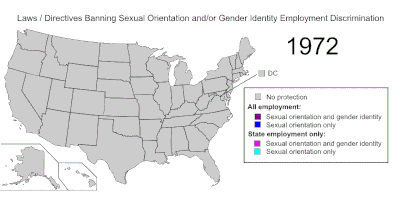Transgender legal history in the United States
[2][3] In 1971, Bernardsville, New Jersey junior high music teacher Paula Grossman was fired from her position of 14 years after openly transitioning and announcing her identity as a woman.
1210 (D. Conn. 1975), a Connecticut court found that substantial state interest must be demonstrated to justify refusing to grant a change in sex recorded on a birth certificate.
In 1995 in Washington, D.C., Tyra Hunter, a transgender woman, died after being denied medical care by ER staff due to her gender identity.
A subsequent New York Times article, "An Inconvenient Woman", documented the marginalization and misrepresentation of transgender sexuality even by gay rights activists.
A subsequent lawsuit, Lopez v. River Oaks Imaging & Diagnostic Group, Inc., established there was discrimination under Title VII of the Civil Rights Act of 1964.
In 2008 the District Court of DC ruled in favor of Diane Schroer, who was denied a position as a terrorism research analyst at the Library of Congress after revealing that she would be transitioning from male to female.
The issue for the court was whether a taxpayer who has been diagnosed with gender identity disorder can deduct sex reassignment surgery costs as necessary medical expenses under 26 U.S.C. § 213.
[30] But in 2015, it was announced that effective January 1, 2016, insurance companies that participate in the Federal Employees Health Benefits Program must include transition-related coverage.
Olson stated in a press release that "the Obama Administration strongly overreached by unilaterally redefining the definition of 'sex' with respect to the Civil Rights Act outside of the lawmaking process.
"[43] In 2013 the EEOC ruled in favor of an openly transgender woman who was subjected to physical and verbal harassment at her job with a federal contractor in Maryland.
[44] This, according to the LGBT rights organization Freedom to Work, is the first time in history that the EEOC has investigated allegations of anti-transgender harassment and ruled for the transgender employee.
Under Title IX, a recipient generally must treat transgender students consistent with their gender identity in all aspects of the planning, implementation, enrollment, operation, and evaluation of single-sex classes.
[55] Also in 2015, the Equal Employment Opportunity Commission ruled for the first time that Army-imposed restroom restrictions on a transgender civilian employee (Tamara Lusardi) violated the sex discrimination provisions of the Civil Rights Act of 1964.
Departments of Health and Human Services, Labor, and the Treasury declaring that when:[57][58]an attending provider determines that a recommended preventive service is medically appropriate for the individual – such as, for example, providing a mammogram or pap smear for a transgender man who has residual breast tissue or an intact cervix – and the individual otherwise satisfies the criteria in the relevant recommendation or guideline as well as all other applicable coverage requirements, the plan or issuer must provide coverage for the recommended preventive service, without cost sharing, regardless of sex assigned at birth, gender identity, or gender of the individual otherwise recorded by the plan or issuer.In 2016, the U.S. Department of Health and Human Services ruled for the first time that transgender people are entitled to surgical benefits provided under Medicare Advantage insurers, including sex reassignment surgery; the ruling came in a case regarding the transgender woman Charlene Lauderdale but does not only apply to her.
[59] Also in 2016, guidance was issued by the Departments of Justice and Education stating that schools which receive federal money must treat a student's gender identity as their sex (for example, in regard to bathrooms).
[66] Late in 2016, an injunction was issued against a federal regulation created to prevent health care discrimination on the basis of gender identity (as well as abortion).
[69][70] In that case, Joshua Brandon Vallum pled guilty to murdering Mercedes Williamson in 2015 because she was transgender, in violation of the Matthew Shepard and James Byrd, Jr.
[81] One contentious element of the law eliminates anti-discrimination protections for gay, bisexual, transgender, genderqueer, and intersex people, and legislated that in government buildings, individuals could only use restrooms and changing facilities that correspond to the sex on their birth certificates.
[90] On May 9, 2016, the United States Department of Justice sued Governor Pat McCrory, the North Carolina Department of Public Safety, and the University of North Carolina system, stating that House Bill 2 violates Title VII of the Civil Rights Act, Title IX of the Education Amendments of 1972, and the Violence Against Women Act.
[94] In 2015 the Army issued a directive that protected transgender soldiers from being dismissed by mid-level officers by requiring the decision for discharge to be made by the service's top civilian for personnel matters.
[96] Later in 2015, Navy Secretary Ray Mabus signed a memorandum directed to the Chief of Naval Operations and Commandant of the Marine Corps stating: "Effective immediately, separations initiated under the provisions of the reference for service members with a diagnosis or history of gender dysphoria, who identify themselves as transgender, or who have taken steps to externalize the condition, must be forwarded to the assistant secretary of the Navy (manpower and reserve affairs) for decision.
"[97] Still later in 2015, Defense Secretary Ash Carter ordered the creation of a Pentagon working group "to study over the next six months the policy and readiness implications of welcoming transgender persons to serve openly.
"[98] He also stated that all decisions to dismiss troops with gender dysphoria would be handled by the Pentagon's acting under Secretary of Defense for personnel and readiness (Brad Carson).
[103] On August 28, 2017, the American Civil Liberties Union (ACLU) of Maryland filed a federal lawsuit, Stone v. Trump, on behalf of several transgender military service members, alleging that the ban violated their equal protection rights.
Mattis stated he would set up a panel of experts from the Departments of Defense and Homeland Security to provide recommendations on implementing the President's policy direction.
[113] In 2016, the U.S. Department of Justice released guidelines forbidding corrections agencies from placing transgender inmates into men's or women's units solely based on their anatomy at birth.
The court subsequently invalidated her revision to her birth certificate, as well as her Kentucky marriage license, ruling "We hold, as a matter of law, that Christie Littleton is a male.
Several states, including Alabama, Arizona, Missouri, Texas, and Louisiana, have enacted laws that restrict or outright ban gender-affirming care for transgender minors.
[129] Laws in states like Florida and South Dakota restrict discussions of gender and sexual orientation in schools, with civil penalties for violations that can include lawsuits and fines.
Maryland has expanded nondiscrimination laws to include gender identity, protecting students in both public and private schools that receive state funding.


